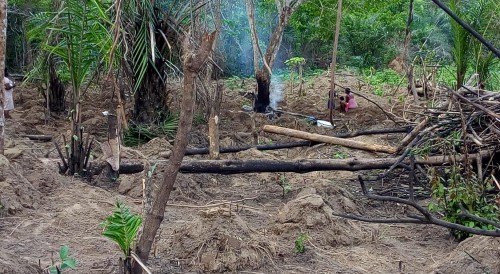Tropical Plant Research
An International Journal by Society for Tropical Plant Research
2019, VOLUME 6 ISSUE 1Pages: 106-114
Quantification of the effect of agriculture on forest carbon stock: Case study of a Nigerian forest reserve
T. E. Ogana* and F. N. Ogana
*Department of Social and Environmental Forestry University of Ibadan, Ibadan, Nigeria
Abstract:
The competition for land between forest and agriculture has been a long-time issue. The tropical forest has been greatly reducing due to agricultural activities. There are few studies on the quantification of forest carbon stock loss caused by encroaching agricultural activities. Therefore, this study compared the biomass in the areas encroached by farming activities and forested areas; and also analyzed the forest cover change in Cross River South Forest Reserve, Nigeria. Data were obtained through forest inventory and satellite imageries. Eight sample plots of 0.25 ha were used (plots were laid in the forested and the encroached parts of the reserve). Established allometric equation was used to estimate the biomass. Satellite images from Landsat between 2002 and 2017 were used for the forest cover change. The results showed that there is a significant difference in the mean aboveground carbon density of the forested part (108.6571 tC ha-1) and the encroached part (44.1567 tC ha-1) of the reserve. The forest cover change of Forest Reserve showed that about 6,750 ha was deforested within the period with an annual rate of forest cover loss of 0.54%. It was concluded that the farming activities have negatively impacted the quantity of carbon stock of the forest reserve.
The competition for land between forest and agriculture has been a long-time issue. The tropical forest has been greatly reducing due to agricultural activities. There are few studies on the quantification of forest carbon stock loss caused by encroaching agricultural activities. Therefore, this study compared the biomass in the areas encroached by farming activities and forested areas; and also analyzed the forest cover change in Cross River South Forest Reserve, Nigeria. Data were obtained through forest inventory and satellite imageries. Eight sample plots of 0.25 ha were used (plots were laid in the forested and the encroached parts of the reserve). Established allometric equation was used to estimate the biomass. Satellite images from Landsat between 2002 and 2017 were used for the forest cover change. The results showed that there is a significant difference in the mean aboveground carbon density of the forested part (108.6571 tC ha-1) and the encroached part (44.1567 tC ha-1) of the reserve. The forest cover change of Forest Reserve showed that about 6,750 ha was deforested within the period with an annual rate of forest cover loss of 0.54%. It was concluded that the farming activities have negatively impacted the quantity of carbon stock of the forest reserve.

Fig.: Woman burning a tree on the cultivated land inside the forest reserve.
| 0 | 1 | 2 | 5 | 8 | 3 | 9 | 6 |


